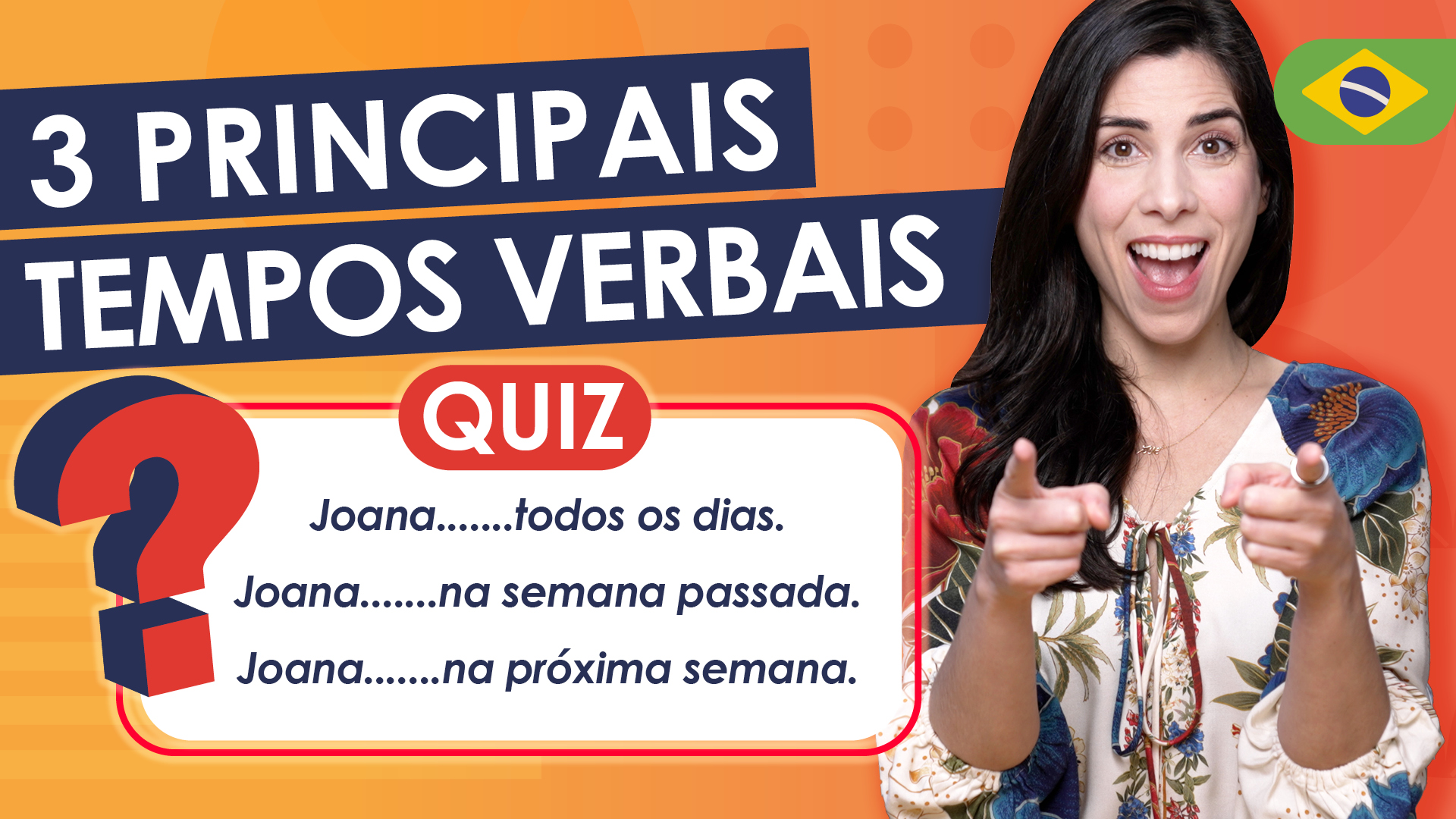This lesson includes a free PDF with exercises for you to practice conjugating irregular verbs in Portuguese. Fill out the form below to download your worksheet.
Olá, queridos alunos! (Hello, dear students!)
There are hundreds of irregular verbs in Portuguese, but the good news is that you don’t need to learn all of them because many are not used in everyday life.
In this lesson, you will learn the 20 most commonly used irregular verbs, their complete conjugation in the present tense, and examples in sentences.
Watch the video to test your conjugation skills!
20 Irregular Verbs in Brazilian Portuguese
1. Ser (to be)
Eu sou brasileira. (I am Brazilian.)
Você é americano. (You are American.)
Nós somos alemães. (We are German.)
Eles são ingleses. (They are English.)
Note that the pronouns “você,” “ele,” “ela,” and “a gente” all use the same conjugation:
Você é (You are)
Ele é (He is)
Ela é (She is)
A gente é (We are – informal)
Similarly, the pronouns “vocês,” “eles,” and “elas” share the same conjugation:
Vocês são (You (all) are)
Eles são (They (male) are)
Elas são (They (female) are)
This rule applies to all verbs.
2. Estar (to be)
Eu estou em casa. (I am at home.)
Você está no trabalho. (You are at work.)
Nós estamos na praia. (We are at the beach.)
Eles estão no Brasil. (They are in Brazil.)
3. Ter (to have)
Eu tenho três irmãos. (I have three brothers.)
Você tem duas irmãs. (You have two sisters.)
Nós temos muitos amigos. (We have many friends.)
Eles têm filhos. (They have children.)
Note that the pronunciation of “tem” without an accent and “têm” with an accent is the same.
4. Ir (to go)
Eu vou ao banco. (I go to the bank.)
Você vai à universidade. (You go to the university.)
Nós vamos à farmácia. (We go to the pharmacy.)
Eles vão ao trabalho. (They go to work.)
5. Vir (to come)
Eu venho aqui todos os dias. (I come here every day.)
Você vem aqui regularmente. (You come here regularly.)
Nós vimos sempre aqui. (We always come here.)
Eles vêm aqui todo mês. (They come here every month.)
Note that the pronunciation of “vem” without an accent and “vêm” with an accent is the same.
6. Ver (to see)
Eu vejo meus amigos toda semana. (I see my friends every week.)
Você vê seus pais nos feriados. (You see your parents on holidays.)
Nós vemos pássaros pela janela. (We see birds through the window.)
Eles veem televisão à noite. (They watch television at night.)
7. Dar (to give)
Eu dou presentes a meus amigos. (I give gifts to my friends.)
Você dá flores a sua mãe. (You give flowers to your mother.)
Nós damos apoio a amigos. (We give support to friends.)
Eles dão bons conselhos. (They give good advice.)
8. Dizer (to say/ tell)
Eu digo sempre a verdade. (I always tell the truth.)
Você diz coisas interessantes. (You say interesting things.)
Nós dizemos o que pensamos. (We say what we think.)
Eles dizem que vão chegar tarde. (They say they will arrive late.)
9. Fazer (to do/ make)
Eu faço café todas as manhãs. (I make coffee every morning.)
Você faz o almoço todo dia. (You make lunch every day.)
Nós fazemos planos para viajar. (We make plans to travel.)
Eles fazem o jantar juntos. (They make dinner together.)
10. Poder (can/ be able)
Eu posso te ajudar. (I can help you.)
Você pode fazer isso. (You can do this.)
Nós podemos sair agora. (We can leave now.)
Eles podem esperar aqui. (They can wait here.)
11. Ler (to read)
Eu leio todas as noites. (I read every night.)
Você lê livros interessantes. (You read interesting books.)
Nós lemos notícias pela manhã. (We read the news in the morning.)
Eles leem para as crianças. (They read to the children.)
12. Ouvir (to listen)
Eu ouço música todos os dias. (I listen to music every day.)
Você ouve rádio pela manhã. (You listen to the radio in the morning.)
Nós ouvimos podcasts. (We listen to podcasts.)
Eles ouvem música alta. (They listen to loud music.)
13. Querer (to want)
Eu quero um café. (I want a coffee.)
Você quer aprender português. (You want to learn Portuguese.)
Nós queremos viajar ao Brasil. (We want to travel to Brazil.)
Eles querem falar com você. (They want to talk to you.)
14. Saber (to know)
Eu sei quem ele é. (I know who he is.)
Você sabe a resposta. (You know the answer.)
Nós sabemos a verdade. (We know the truth.)
Eles sabem o motivo. (They know the reason.)
15. Pedir (to ask/ order)
Eu peço silêncio na aula. (I ask for silence in class.)
Você pede ajuda ao professor. (You ask the teacher for help.)
Nós pedimos pizza às sextas. (We order pizza on Fridays.)
Eles pedem um favor. (They ask for a favor.)
16. Sair (to leave / go out)
Eu saio cedo hoje. (I leave early today.)
Você sai do trabalho tarde. (You leave work late.)
Nós saímos após o almoço. (We leave after lunch.)
Eles saem para jantar hoje. (They go out for dinner today.)
17. Trazer (to bring)
Eu trago boas notícias. (I bring good news.)
Você traz vinho para o jantar. (You bring wine for dinner.)
Nós trazemos a sobremesa. (We bring dessert.)
Eles trazem novas ideias. (They bring new ideas.)
18. Rir (to laugh)
Eu rio das piadas do meu marido. (I laugh at my husband’s jokes.)
Você ri com seus amigos. (You laugh with your friends.)
Nós rimos de coisas simples. (We laugh at simple things.)
Eles riem o tempo todo. (They laugh all the time.)
19. Pôr (to put)
Eu não ponho açúcar no café. (I don’t put sugar in coffee.)
Você põe as roupas no armário. (You put the clothes in the closet.)
Nós pomos os livros na mesa. (We put the books on the table.)
Eles põem as flores no vaso. (They put the flowers in the vase.)
20. Haver (translation varies)
I saved this verb for last because it’s a bit unusual. Normally, the verb “haver” is not conjugated for “I” or “you.” It is usually used in the third person singular to mean “there is/are” or to indicate elapsed time. For example:
Há muitas pessoas na festa. (There are many people at the party.)
Eu moro nos EUA há 12 anos. (I’ve been living in the U.S. for 12 years.)
Free PDF!
This lesson includes a free PDF with exercises for you to practice conjugating irregular verbs in Portuguese.
Fill out the form below to download your worksheet.
Online Brazilian Portuguese Courses
If you enjoyed this lesson, you’ll love our courses! At Speaking Brazilian School, we offer digital courses, small group classes, and private lessons. Click here to learn more about our Brazilian Portuguese online classes.
Até a próxima!
Virginia & Speaking Brazilian Team


